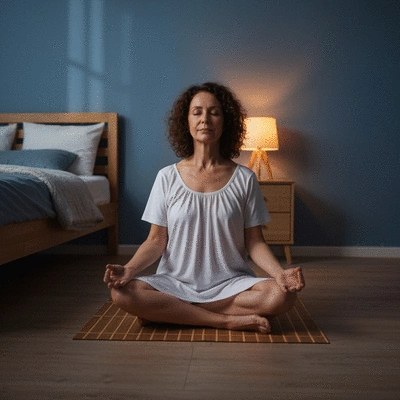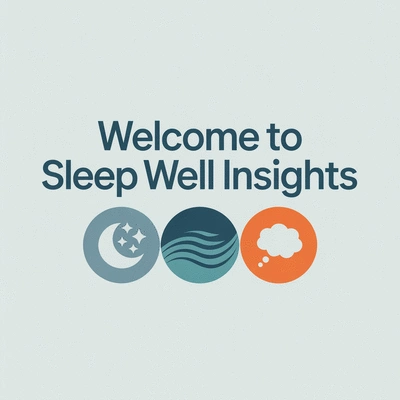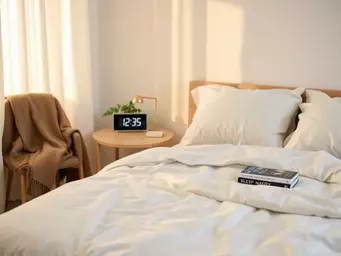What if the key to better sleep lies in understanding the invisible ties between stress, anxiety, and insomnia? As we navigate the complexities of our daily lives, these often-overlooked factors can wreak havoc on our rest. The good news? By recognizing their interplay, you can take actionable steps toward more restful nights.
What You Will Learn
- Understanding Key Terms: Learn the definitions of stress, anxiety, and chronic insomnia, which are crucial for grasping their interconnection.
- Physiological Impact: Discover how stress and anxiety trigger physiological responses that disrupt sleep patterns.
- Cortisol's Role: Understand how elevated cortisol levels affect sleep cycles, leading to difficulties in falling and staying asleep.
- Effective Sleep Strategies: Explore practical habits that can help mitigate the adverse effects of stress and anxiety on your sleep quality.
The Interplay of Stress, Anxiety, and Chronic Insomnia
This visual represents the interconnected relationship between stress, anxiety, and chronic insomnia, highlighting how each factor can influence and exacerbate the others.
Stress & Hyperarousal
Elevated physiological response, making it difficult for the body to relax and transition into sleep.
Learn More →Anxiety & Racing Thoughts
Persistent worry and an active mind hinder the ability to fall asleep and maintain sleep.
Insights on Anxiety →Cortisol Level Fluctuations
Stress causes cortisol spikes, disrupting natural circadian rhythms and interfering with sleep cycles.
Practical Strategies →Chronic Insomnia Cycle
A persistent difficulty in achieving restful sleep, often both a cause and consequence of stress and anxiety.
View Solutions →Understanding the Connection Between Stress, Anxiety, and Chronic Insomnia
Have you ever wondered how stress and anxiety could be silently sabotaging your sleep? Many people experience this frustrating cycle where the weight of daily stressors leads to sleepless nights. At Sleep Well Insights, we believe that understanding this connection is the first step toward reclaiming restful sleep.
Let’s break it down. Chronic insomnia is not just a standalone issue; it often intertwines with mental health challenges like stress and anxiety. Recognizing these links can empower you to take informed actions to improve your sleep quality.
Defining Key Terms: Stress, Anxiety, and Chronic Insomnia
First, let’s clarify what we mean by these terms. Stress refers to the body's response to external pressures or demands, while anxiety is a feeling of worry or fear that can be persistent. Chronic insomnia, on the other hand, is defined as difficulty falling asleep or staying asleep for a prolonged period, typically at least three times a week for three months or more. For a comprehensive definition of chronic insomnia, you can refer to resources like the Journal of Sleep Research.
- Stress: A physiological and psychological reaction to challenges
- Anxiety: Ongoing worry that often complicates life
- Chronic Insomnia: A persistent difficulty in achieving restful sleep
Understanding these definitions lays the groundwork for exploring how they interconnect and contribute to sleeplessness.
Why Stress and Anxiety Are Common Causes of Sleep Disorders
Stress and anxiety can trigger a range of physiological responses that disrupt sleep patterns. When your mind is racing with worries, it’s challenging to achieve the calm needed for a good night’s rest. In fact, studies have shown that individuals experiencing high levels of stress and anxiety are more likely to suffer from insomnia, as detailed by the National Center for Biotechnology Information.
- Stress can lead to increased heart rates and tension in the body.
- Anxiety often results in racing thoughts that make it difficult to relax.
- The cycle of worrying about sleep can ironically make the problem worse.
By understanding the root causes of your insomnia, you can start to address the underlying issues and work towards effective solutions.
Physiological Mechanisms Behind Stress and Insomnia
The relationship between stress, anxiety, and insomnia isn't just psychological; it also involves complex physiological processes that affect how our bodies respond to stressors. By delving into these mechanisms, I hope to shed light on why managing stress and anxiety is crucial for improving sleep quality.

The Role of the HPA Axis in Stress Response
The hypothalamic-pituitary-adrenal (HPA) axis plays a vital role in how our body reacts to stress. When you encounter a stressor, this system triggers the release of hormones, particularly cortisol, which prepares your body for a “fight or flight” response. This can be beneficial in the short term but detrimental if it becomes chronic.
- Cortisol can lead to heightened alertness, making it harder to wind down.
- Persistent high cortisol levels can disrupt the sleep cycle.
- Understanding this mechanism is key to addressing insomnia caused by stress.
Recognizing the physiological responses can help you identify when stress might be affecting your sleep, paving the way for more effective coping strategies.
How Cortisol Levels Affect Sleep Patterns
Elevated cortisol levels, particularly in the evening, can interfere with the body's natural circadian rhythms. This disruption can result in difficulty falling asleep and maintaining deep sleep phases. Research, such as that published in the Journal of Sleep Research, highlights the significant impact of cortisol on sleep. At Sleep Well Insights, we advocate for strategies to manage these cortisol spikes, such as engaging in relaxation techniques or regular physical activity.
Consider monitoring your cortisol levels, if possible, and work on strategies to lower them, especially before bedtime!
Interactive Poll: Share Your Thoughts!
As we've explored the complex relationship between stress, anxiety, and chronic insomnia, we’d love to hear from you! Which of the following strategies do you currently use to manage stress and improve your sleep?
Summarizing the Interplay of Stress, Anxiety, and Chronic Insomnia
As we delve into the intricate relationship between stress, anxiety, and chronic insomnia, it’s clear that these factors are deeply interconnected. Understanding this connection is essential for anyone looking to improve their sleep quality. Chronic insomnia often acts as both a cause and consequence of elevated stress and anxiety levels, creating a challenging cycle that can be hard to break.
Research consistently shows that when stress levels peak, it can trigger a range of anxiety responses. This, in turn, can contribute to disrupted sleep patterns. Here are some key takeaways from the science behind these sleep disruptions:
- Stress and anxiety can lead to hyperarousal: This heightened state makes it difficult for the body to relax and transition into sleep.
- Cortisol levels fluctuate: Stress causes cortisol, a hormone associated with the body’s stress response, to spike, which can interfere with sleep cycles.
- Sleep patterns are influenced by emotional state: Anxiety can lead to racing thoughts that keep the mind active, hindering the ability to fall asleep.
Recognizing these dynamics is the first step toward taking control of your sleep. At Sleep Well Insights, we believe that awareness empowers action!
Encouraging Healthy Sleep Habits to Combat Stress and Anxiety
By cultivating healthy sleep habits, you can significantly reduce the adverse effects of stress and anxiety on your sleep. Simple adjustments to your nightly routine can make a world of difference. Here are some effective strategies to consider:
- Establish a consistent sleep schedule: Go to bed and wake up at the same time every day, even on weekends.
- Create a calming bedtime routine: Engage in relaxing activities before sleep, such as reading or gentle stretching.
- Limit screen time: Reduce exposure to screens at least an hour before bed to help your mind unwind.
- Optimize your sleep environment: Make your bedroom dark, cool, and quiet to promote restful sleep.
Implementing these habits can help break the cycle of stress-induced insomnia, allowing you to enjoy more restorative sleep. Remember, it’s the little changes that often lead to significant improvements!
Frequently Asked Questions (FAQs)
- Q: What is the difference between stress and anxiety regarding sleep?
- A: Stress is the body's response to external pressures, while anxiety is a persistent feeling of worry or fear. Both can lead to physiological responses that disrupt sleep, such as increased heart rate and racing thoughts, making it difficult to fall or stay asleep.
- Q: How does chronic insomnia relate to stress and anxiety?
- A: Chronic insomnia is a persistent difficulty with sleep, often defined as occurring at least three times a week for three months or more. It is deeply intertwined with stress and anxiety, acting as both a cause and consequence, creating a challenging cycle that exacerbates sleep problems.
- Q: What is the HPA axis, and how does it affect my sleep?
- A: The Hypothalamic-Pituitary-Adrenal (HPA) axis is a central neuroendocrine system that controls reactions to stress. When activated by stress, it releases hormones like cortisol, which can increase alertness and disrupt natural circadian rhythms, making it harder to fall asleep and maintain deep sleep.
- Q: How can I manage elevated cortisol levels impacting my sleep?
- A: Managing cortisol levels involves strategies like engaging in relaxation techniques (meditation, deep breathing), regular physical activity, and maintaining a consistent sleep schedule. Limiting screen time before bed and optimizing your sleep environment can also help.
- Q: What are some practical steps I can take to improve my sleep when I'm stressed or anxious?
- A: Key steps include establishing a consistent sleep schedule, creating a calming bedtime routine (reading, gentle stretching), limiting screen time an hour before bed, and optimizing your sleep environment (dark, cool, quiet). Lifestyle changes like regular exercise, a balanced diet, and mindfulness also play a crucial role.
Taking Action: Your Path to Better Sleep
Inviting Readers to Share Their Experiences and Strategies
Now that we’ve explored the connection between stress, anxiety, and insomnia, I encourage you to share your experiences and any strategies that have worked for you. At Sleep Well Insights, we foster a supportive community where personal stories can inspire others. What techniques have helped you manage your stress? How has your journey with insomnia evolved?
Resources for Further Reading on Stress Management and Sleep Health
For those seeking to deepen their understanding of stress management and its relationship to sleep health, I recommend checking out the following resources:
- Our comprehensive guide on stress management
- Insights on how anxiety affects sleep
- Practical strategies for insomnia relief
These articles provide valuable insights that can empower you to take action in your own life. Knowledge is power!
The Importance of Lifestyle Changes for Long-Term Sleep Improvement
As you embark on your journey to better sleep, remember that lifestyle changes play a crucial role. Incorporating healthy habits can lead to sustained improvements in sleep quality and overall well-being. Here are a few essential lifestyle adjustments to consider:
- Exercise regularly: Aim for at least 30 minutes of moderate exercise most days of the week.
- Eat a balanced diet: Nutrition impacts sleep, so focus on whole foods and limit caffeine and sugar intake.
- Practice mindfulness: Techniques like meditation or deep breathing can help manage stress levels throughout the day.
By taking small steps toward a healthier lifestyle, you’ll not only improve your sleep but also enhance your overall quality of life. It’s all about making choices that support your well-being!

Recap of Key Points
Here is a quick recap of the important points discussed in the article:
- Understanding the Connection: Stress and anxiety are significant contributors to chronic insomnia, creating a challenging cycle that can disrupt sleep.
- Physiological Mechanisms: The HPA axis and elevated cortisol levels play crucial roles in how stress affects sleep patterns, leading to difficulty in relaxing and falling asleep.
- Healthy Sleep Habits: Establishing a consistent sleep schedule, creating a calming bedtime routine, and optimizing your sleep environment are effective strategies for improving sleep quality.
- Lifestyle Changes: Incorporating regular exercise, a balanced diet, and mindfulness practices can significantly enhance sleep quality and overall well-being.










